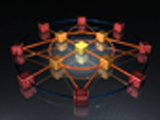IMDEA Networks

Archivos: Events
Defensa Tesis Doctoral: The Role of Topology and Contracts in Internet Content Delivery
The Internet depends on economic relationships between ASes (Autonomous Systems), which come in different shapes and sizes - transit, content, and access networks. CDNs (Content delivery networks) are also a pivotal part of the Internet ecosystem and construct their overlays for faster content delivery.
Seguir leyendo arrow_right_altA Look at Basics of Distributed Computing
The talk will present concepts and basics of distributed computing which are important (at least from the presenter's point of view!), and should be known and mastered by researchers, and Master students. Those include: (a) a characterization of distributed computing (which is too much often confused with parallel computing); (b) the notion of a synchronous system and its associated notions of a local algorithm and message adversaries; (c) the notion of an asynchronous shared memory system and its associated notions of universality and progress conditions; and (d) the notion of an asynchronous message-passing system with its associated broadcast and agreement abstractions, its impossibility results, and approaches to circumvent them. Hence, the talk can be seen as a guided tour to key elements that constitute basics of distributed computing.
Seguir leyendo arrow_right_altHuman behavior: the interaction governing complex socio-technological systems
Understanding complex physical systems requires knowledge of the interactions among their constituents, in order to be able to predict emergent behaviors (i.e., of the system as a whole).
Seguir leyendo arrow_right_altOptimization of mobile crowd-sensing and recommender system platforms
The main themes of the talk are the optimization of mobile crowd-sensing and recommender system platforms from the point of view of the system designer. In the first part of the talk, we first discuss optimization of mobile crowd-sensing campaigns in terms of total expected quality for a set of tasks to be accomplished, and in terms of compensation cost to task contributors.
Seguir leyendo arrow_right_altRecent Research Insights from MIT Sloan's Center for Information Systems Research (MIT CISR): Expanding the Reach of Digital Innovation
To compete in sectors where the customer experience is increasingly digitized, companies are scrambling to expand their portfolio of innovations – from new products and enhanced processes to complementary services and new business models. In the process IT units are figuring out how to share responsibilities with, and coordinate the efforts of, internal stakeholder groups, such as marketing, operations and R&D, as well as the efforts of external parties, such as vendors, business partners, start-ups, and even individual contractors and hobbyists. This seminar will be an opportunity to learn about and discuss the most recent research insights from an MIT CISR research project on digital innovation.
Seguir leyendo arrow_right_alt
Understanding Capacity Scaling through Dense Deployments in Future Radio Access Networks
Today's heterogeneous networks comprised of mostly macro cells and indoor small cells will not be able to meet the upcoming traffic demands. Indeed, it is forecasted that at least a 100x network capacity increase will be required to meet the traffic demands in 2020.
Seguir leyendo arrow_right_altSmart Indoor Visible Light Communications
Visible light communications are becoming a major short range wireless communication technology. Incorporating communication into existing lighting infrastructure, VLCs are potential candidate for future indoor communications.
Seguir leyendo arrow_right_altDistributed power and rate control in wireless networks
The standard interference functions introduced by Yates have been very influential on the analysis and design of distributed power control laws. While powerful and versatile, the framework has some drawbacks: the existence of fixed-points has to be established separately, and no guarantees are given on the rate of convergence of the iterates.
Seguir leyendo arrow_right_altInformation Centric Networking: Addressing Information at the Network Level
Imagine a network in which you address information: literally, packet-level addressing of *information* rather than hosts. For example, you may request the front page of El País with a request packet addressed to "the front page of El País"! Then the network forwards the request to some server that can produce the right data (possibly cached) and then delivers that data back to you.
Seguir leyendo arrow_right_altThis is Why Adtech Can’t Have Nice Things
By 2025 ad fraud will be the second largest form of organized crime, resulting in losses of up to $1 trillion in damages to the society, creating an unprecedented burden to national economies and tax payers. In this talk you will gain deep insight in to various aspects of the problem; the three modes of ad fraud, money flows, botnet hunting, spam-site detection, adversary profiles and researcher safety. The talk is aimed at researchers, and includes many information that has never been disclosed to public.
Seguir leyendo arrow_right_alt











Comentarios recientes